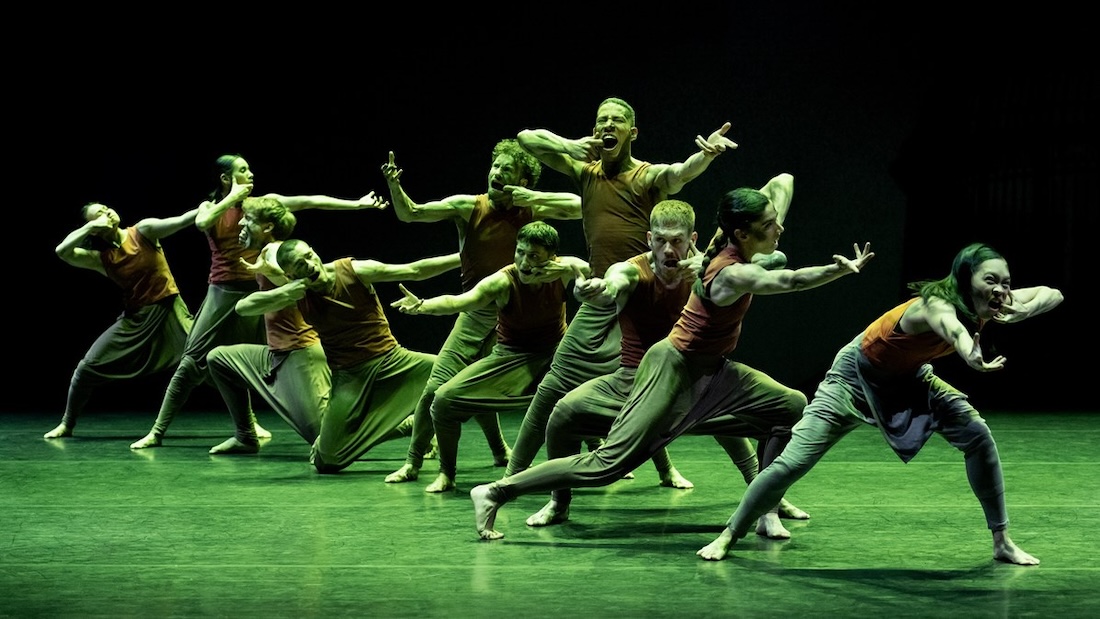
Jungle Book: Reimagined at State Theatre Centre of WA
Jungle Book: Reimagined at State Theatre Centre of WA
Saturday, February 10, 2024
Akram Khan Company have once again outdone themselves, delivering a phenomenal work in their recent Perth Festival run of Jungle Book: Reimagined.
Travelling from the United Kingdom, this international production was identified as one of the headlining events of Perth Festival, presenting a modern re-telling of Kipling’s famous children’s work through spoken word, audio-visual design, and of course, dance and movement. The production did not disappoint in its delivery of such a premise, hitting the mark on all elements.
Despite the large proportion of children in the crowds on show day, Jungle Book: Reimagined would probably not be best described as a child-friendly remaking of the beloved classic. Centering its noir and gritty re-telling within the anxiety-ridden zeitgeist of climate catastrophe, mass extinction and the oncoming anthropocene, Jungle Book: Reimagined grounded itself in the portrayal of Mowgli, a young female protagonist, as a climate refugee who finds herself stranded in the jungle while fleeing the rising waters brought on by human activity.
Brought to life by a small yet mighty ensemble of international performers, the show unwove itself slowly but with a sense of intimacy and calm, focusing on the ‘slow living’ of the animals and really taking the time to tease out relationships and moments of peace before picking up the pacing further in.
The sense of ensemble within the piece was exquisite, and the synchronicity of the performers was commendable, but so too was watching each individual’s take on the myriad of animal forms that emerged throughout the narrative. Watching wolves, monkeys, bears and snakes evolve and devolve on stage was visually ensnaring and executed to perfection.
Interestingly, while at times the ‘animalia’ of the performer’s movements were obvious, the specific animals portrayed were not, which was actually quite effective, creating amorphous beings tied to the limits of a human corporeal form. Particularly as the production unwound itself around human-created issues of animal testing, trophy hunting, animal abuse, mass consumption and the frenzies of late-stage capitalism, the human presence in the portrayal of the animals felt like a fitting complexity.
Performers Maya Balam Meyong, Tom Davis-Dunn, Hector Ferrer, Harry Theadora Foster, Filippo Franzese, Bianca Mikahil, Max Revell, Matthew Sandiford, Elpida Skourou, Holly Vallis, Jan Mikaela Villanueva and Lani Yamanaka each deserve individual commendation for their contribution to the works.
While initially jarring, the pre-recorded lines of characters were an interesting choice, obviously freeing up the actors to focus on the movements and embodiments of the characters. The variety of strong English accents within the vocal recordings, obviously a product of its recording location, lent an odd neo-colonial element to the narrations of jungle animals, whether intentionally or otherwise, which was difficult to ignore. Overall, however, the arrangement of vocal acting, sound design and soundscaping was an auditory delight and strongly drove the sense of emotion throughout the largely non-verbal story.
Commendation is due in large part to the eponymous company leader Akram Khan, whose presence in the direction, and particularly choreography, of the piece was strongly felt. Even to the untrained eye, the complexity of movements, the determination to relay hard-hitting themes, and the sense of emotion were palpable and highly affective.
In addition, the use of visual projections played onto a large transparent curtain element added another dimension to the story-telling, often adding jungle creatures and important locations but also creating moments of stillness on stage by telling the protagonist’s story through emotive line art and animation. As a result, the multi-use of the technology was an innovative design decision and often a source of the most intense emotions throughout the show, pairing perfectly with the choreography. It paired extremely well with the simplistic, almost Brechtian stage design, which featured walls of cardboard boxes—a refreshingly sustainable design choice for a company decrying consumption and human destruction.
A gripping and emotional take on the beloved children’s classic, for a new generation facing much scarier realities than the likes of bears and snakes, Jungle Book: Reimagined was a visual masterpiece, an important show, and a heartfelt love letter to the emerging generations who have been handed the responsibility of a dying world.
BEC WELDON
